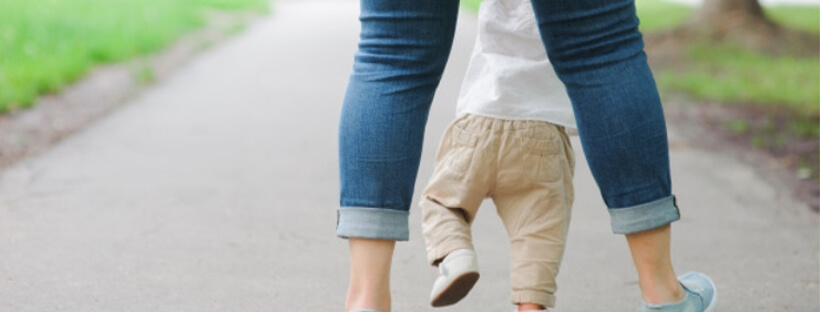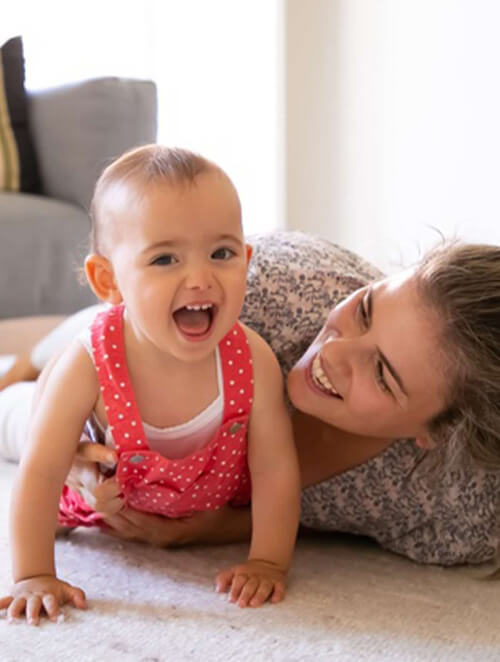Signs That Your Baby Is Ready To Walk Plus How To Encourage Him
 17806
17806

super easy
One can barely be patient to witness their little munchkin take their first steps. After all, it is not only a big deal but also a significant milestone in a baby’s development. You prepare your camera in hand and prepare yourself to capture those golden moments forever. Truly, looking at your little one take their initial steps is one of the most delightful experiences one can have.
Generally, kids start walking anytime between 9 and 18 months of age. Walking is, in fact, a major developmental milestone that children achieve after crawling. However, since every child is unique, some may miss out on the crawling phase altogether after sitting straight and learn to walk on their toes right after, while some may take some time to gain enough confidence to take those precious first steps.
Strong upper body muscles develop during the first few months, the leg strength that they acquire from months 5 to 7, & the neck strength, head control, balance, and coordination that they obtain up from 6 to 9 months, all work together to help your baby step forward and become a pro walker!
Let’s look at some of the signs and symptoms which hint at the fact that your baby is going to be walking soon:
•Crawling over furniture:
When your child has become proficient in crawling, and wishes to gain an understanding of and indulge in a lot more than ‘just crawling’, they will become nothing less than daredevils in their own right. They will climb and crawl over and above the furniture and cross all possible hurdles
– like baby planks. In fact, you will be surprised to find your baby trying to go up the stairs with the support of their hands.
Child’s Growth at Glance


•Pulling up:
One of the second most commonly seen signs in babies who want to walk is that they start exerting their body weight and pulling themselves up. They desire to stand and try to do this by pulling up on sofas, holding on to the railings, or simply tugging at your legs.
•Standing independently:
Your younger one may be all set to take their first steps if they know how to stand independently, without your support. However, it could take as long as three months before they actually take their first step, after learning how to stand independently. When they learn to stand without support, they gain confidence. And the sooner they start to believe themselves, the sooner they walk.
•Transferring weight between legs:
Once your baby learns to stand all by himself, they will start shifting their body weight from one leg to the other. This helps them build the muscle strength that they require and boosts their confidence in their own abilities and in taking those much-anticipated first steps.
•Cruising:
Now that they’ve learned how to shift the weight between both their legs, they will soon wish to cruise, which means they will start walking by holding onto a push-toy or some other fixed object. This is vital in their forward progression and a great boost to their poise.
As parents, you shoulder a big responsibility of raising your kid’s confidence and helping them out in getting the better of their fearfulness and anxiety. Cuddles, kisses, applauses, words of motivation and encouragement, and avoiding comparison of your child with others can work wonders for your young walker. Here’s how you can help and encourage your kiddo to start walking:
•Help them balance:
Sit on the floor with your child and help them get up and stand. Then count for the seconds that they try holding their standing position. This is a great exercise to learn balance.
•Lure your child into walking up to you:
Stand at a distance from your little one and ask them to walk in your direction. You can also tantalize them by showing their favorite toy or candy. They might topple over in their attempt to walk towards you, but your additional motivating words will help them overcome that distance very soon!
•Commemorate their first steps:
Make your child’s first steps a big deal. Celebrate his milestone and shower your little one with praises. This will very much enhance their self-confidence and help them walk without any assistance.
•Allow them to fall till you consider safe:
Let your baby be aware of the fact that it is normal to fall, and while you’re present, they are in a shielded environment. Some halts and obstacles are totally okay. Ensure that your floor is childproofed well in advance, and
keep a close watch on them as they newly start walking, especially during a couple of initial weeks.
•Encourage them to explore as much as they can:
As your baby gets the hang of walking on leveled and smooth planes, motivate them to walk on uneven areas, and walk a little uphill and downhill sometimes. This will help them in developing a sense of balance and contribute towards making them independent walkers.





Leave a Reply